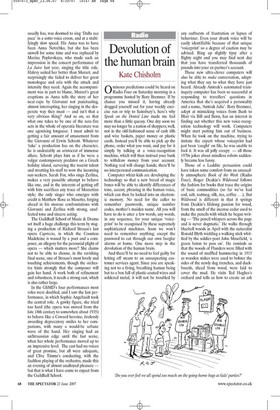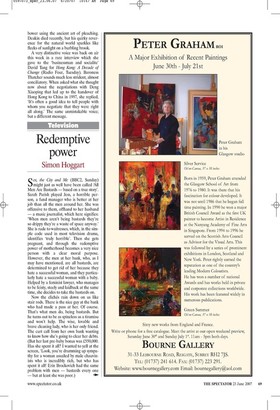Devolution of the human brain
Kate Chisholm minous predictions could be heard on Radio Four on Saturday morning in a programme hosted by Rory Bremner. If by chance you missed it, having already dragged yourself out for your weekly exercise run or trip to Sainsbury's, here's why Speak on the Dotted Line made me feel more than a little queasy. One day soon we may no longer be a nation of shoppers; well, not in the old-fashioned sense of cash tills and wire baskets, paper money or plastic cards. Instead you'll be able to pick up the phone, order what you want, and pay for it simply by talking at a voice-recognition machine, which will then instruct your bank to withdraw money from your account. Nothing real will change hands; there'll be no interpersonal communication.
Computer whizz-kids are developing the technology so that a new breed of magic boxes will be able to identify differences of tone, accent, phrasing in the human voice, which can then be locked into an electronic memory. No need for the caller to remember passwords, unique number codes, mother's maiden name. All you will have to do is utter a few words, any words, in any sequence, for your unique 'voiceprint' to be recognised by these supremely sophisticated machines. Soon we won't need to remember anything; except the password to cut through our own burglar alarms at home. One more step in the devolution of the human brain.
And there'll be no need to feel guilty for letting off steam to an unsuspecting customer services agent. Since you are speaking not to a living, breathing human being but to a box full of plastic-coated wires and soldered metal, it will not be troubled by any outbursts of frustration or lapses of behaviour. Even your drunk voice will be easily identifiable because of that unique 'voiceprint' so a degree of caution may be advised. Ring up slightly tipsy after a flighty night and you may find next day that you have transferred thousands of pounds into your ex-partner's account.
These new ultra-clever computers will also be able to make conversation, adapting what they say to what they have just heard. Already Amtrak's automated traininquiry computer has been so successful at responding to travellers' questions in America that she's acquired a personality and a name, 'Amtrak Julie'. Rory Bremner, adept at mimicking voices from Bush to Blair via Bill and Benn, has an interest in finding out whether this new voice-recognition technology will work. Computers might start putting him out of business. When he took on the machine, trying to imitate the expert whose voiceprint had just been 'caught' on file, he was unable to fool it. It was all jolly creepy — all those 1970s jokes about mindless robots suddenly became less funny.
Those of a Luddite persuasion could have taken some comfort from an unusually atmospheric Book of the Week (Radio Four). Roger Deakin's Wildwood follows the fashion for books that trace the origins of basic commodities (so far we've had cod, salt, nutmeg, silk, tea, coffee. . .). But Wildwood is different in that it springs from Deakin's lifelong passion for wood, from the smell of the incense cedar used to make the pencils with which he began writing — 'The pencil whispers across the page and is never dogmatic.' He walks through bluebell woods in April with the naturalist Ronald Blyth wielding a walking stick whittled by the soldier-poet John Masefield, 'a green baton to pass on'. He reminds us that the woods of Flanders were filled with the sound of muffled hammering in 1915 as wooden stakes were used to bolster the sides of the newly dug trenches, and duckboards, sliced from wood, were laid to cover the mud. He visits Ted Hughes's orchard and tells us how to create an ash bower using the ancient art of pleaching. Deakin died recently, but his quirky reverence for the natural world sparkles like flecks of sunlight on a burbling brook.
A very distinctive voice was back on air this week in a rare interview which she gave to the 'businessman and socialite' David Tang for Hong Kong: A Decade of Change (Radio Four, Tuesday). Baroness Thatcher sounds much less strident, almost conciliatory. When asked what she thought now about the negotiations with Deng Xiaoping that led up to the handover of Hong Kong to China in 1997, she replied, 'It's often a good idea to tell people with whom you negotiate that they were right all along.' The same unmistakable voice; but a different message.






























































 Previous page
Previous page